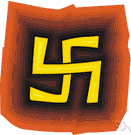swastika
Also found in: Thesaurus, Encyclopedia, Wikipedia.
Related to swastika: Confederate flag, auspiciousness
swas·ti·ka
(swŏs′tĭ-kə)n.
1. An ancient cosmic or religious symbol formed by a Greek cross with the ends of the arms bent at right angles in either a clockwise or a counterclockwise direction.
2. Such a symbol with a clockwise bend to the arms, used as the emblem of the Nazi party and of the German state under Adolf Hitler, officially adopted in 1935.
[Sanskrit svastikaḥ, sign of good luck, swastika, from svasti, well-being; see (e)su- in Indo-European roots.]
American Heritage® Dictionary of the English Language, Fifth Edition. Copyright © 2016 by Houghton Mifflin Harcourt Publishing Company. Published by Houghton Mifflin Harcourt Publishing Company. All rights reserved.
swastika
(ˈswɒstɪkə)n
1. (Heraldry) a primitive religious symbol or ornament in the shape of a Greek cross, usually having the ends of the arms bent at right angles in either a clockwise or anticlockwise direction
2. (Historical Terms) this symbol with clockwise arms, officially adopted in 1935 as the emblem of Nazi Germany
[C19: from Sanskrit svastika, from svasti prosperity; from the belief that it brings good luck]
Collins English Dictionary – Complete and Unabridged, 12th Edition 2014 © HarperCollins Publishers 1991, 1994, 1998, 2000, 2003, 2006, 2007, 2009, 2011, 2014
swas•ti•ka
(ˈswɒs tɪ kə)n., pl. -kas.
1. a symbolic or ornamental figure of ancient origin, consisting of a cross with arms of equal length, each arm having a continuation at right angles in a uniformly clockwise or counterclockwise direction.
2. this figure as the emblem of the Nazi Party and the Third Reich.
[1850–55; < Skt svastika=svasti well-being + -ka secondary n. suffix]
swas′ti•kaed, adj.
Random House Kernerman Webster's College Dictionary, © 2010 K Dictionaries Ltd. Copyright 2005, 1997, 1991 by Random House, Inc. All rights reserved.
swastika
A hooked cross; an ancient religious symbol associated in the late 19th century with the revival of interest in German legends and mythology. It was adopted as a symbol by extreme right-wing groups in Germany from 1919 and was made Germany’s national emblem in 1935.
Dictionary of Unfamiliar Words by Diagram Group Copyright © 2008 by Diagram Visual Information Limited
ThesaurusAntonymsRelated WordsSynonymsLegend:
Switch to new thesaurus
| Noun | 1. |  swastika - the official emblem of the Nazi Party and the Third Reich; a cross with the arms bent at right angles in a clockwise direction swastika - the official emblem of the Nazi Party and the Third Reich; a cross with the arms bent at right angles in a clockwise directiontetraskele, tetraskelion - a figure consisting of four stylized human arms or legs (or bent lines) radiating from a center Deutschland, FRG, Germany, Federal Republic of Germany - a republic in central Europe; split into East Germany and West Germany after World War II and reunited in 1990 |
Based on WordNet 3.0, Farlex clipart collection. © 2003-2012 Princeton University, Farlex Inc.
swastika
noun crooked cross, fylfot On her new brown passport was a black eagle with a swastika.
Collins Thesaurus of the English Language – Complete and Unabridged 2nd Edition. 2002 © HarperCollins Publishers 1995, 2002
Translations
صَليب مَعْقوف
свастика
hákový křížsvastika
hagekorssvastika
esvásticasvastikaswastika
hakaristi
svastika
horogkereszt
hakakross
svastika
kāškrustssvastika
hakekorssvastika
svástica
hákový krížsvastika
svastikaсвастика
hakkorssvastika
gamalı haç
Collins Spanish Dictionary - Complete and Unabridged 8th Edition 2005 © William Collins Sons & Co. Ltd. 1971, 1988 © HarperCollins Publishers 1992, 1993, 1996, 1997, 2000, 2003, 2005
Collins English/French Electronic Resource. © HarperCollins Publishers 2005
swastika
Collins German Dictionary – Complete and Unabridged 7th Edition 2005. © William Collins Sons & Co. Ltd. 1980 © HarperCollins Publishers 1991, 1997, 1999, 2004, 2005, 2007
Collins Italian Dictionary 1st Edition © HarperCollins Publishers 1995
swastika
(ˈswostikə) noun a cross with the ends bent at right angles, adopted as the badge of the Nazi party in Germany before the Second World War.
Kernerman English Multilingual Dictionary © 2006-2013 K Dictionaries Ltd.